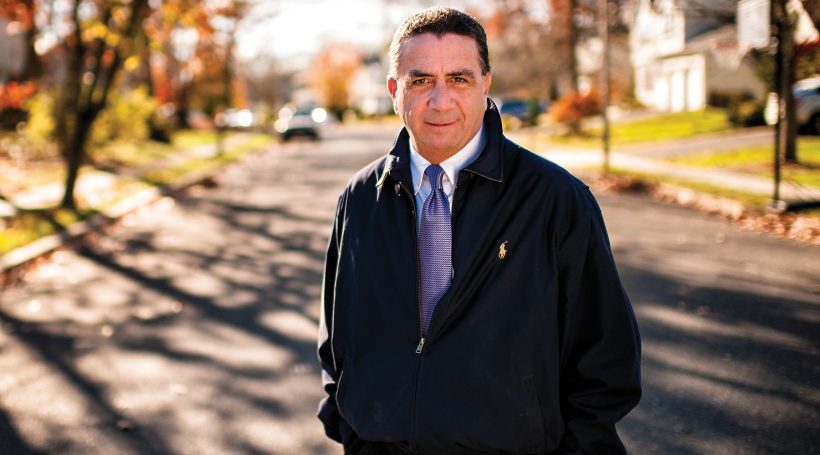On a Saturday afternoon in April, former Washington Township Mayor Paul Moriarty was alone in his home, working on his taxes, when the phone rang. It was a police dispatcher, who told Moriarty to walk slowly out of his house with his hands in the air.
He was being “swatted.” Someone had called in a false alarm and given Moriarty’s address, prompting police and a SWAT team to descend on his house. It was likely a twisted form of retribution – Moriarty, a Democratic Assemblyman in the 4th District, is the sponsor of a new state law that will ensure the perpetrators of such acts see the inside of a prison cell.
“Last year, I started researching the phenomenon, and I realized it was a national epidemic. That’s when I introduced the bill,” says Moriarty, 59. “Then in the late spring all of a sudden these incidents began to happen almost every week somewhere in New Jersey, so the legislation was getting a lot of press. That’s when this started to happen to me.”
That day in April, Moriarty was shocked at the scene in front of his suburban home, which looked like something out of an action movie – or a nightmare.
“The street was closed down and full of cop cars,” he remembers. “They had weapons ready and aimed at the house. I walked out the front door, and they motioned for me to walk to them. The police knew who I was, but they still had to follow protocol.”
Moriarty’s initial experience was arguably tame compared to what other victims of swatting have experienced. The practice began in the gaming community, as a way for gamers to prank one another.
“It started off as a way to stop someone who was playing a game really well or beating you in a game,” Moriarty says. “You’d call the police and make a false report, giving that person’s address. Then, you watch through their webcam as the SWAT team bursts into the person’s house. A lot of these gamers think it’s really funny, but it’s a dangerous game they’re playing. After that first time it happened to me, I got a copy of the audio. It was someone saying they’d just killed their father and they were holding their mother and sister at gunpoint at my house. They just sounded like a very sick person, and that’s who the police were responding to.”
Incidents of swatting are not limited to private residences. Businesses, places of worship and schools have become frequent targets. This past spring, four schools in the Princeton School District dealt with a half-dozen different threats over the course of a few weeks.
“At one point in Princeton they had this happen three times in one week,” Moriarty says. “So that means all the kids are sheltering in place and the school is placed on lockdown. They have to alert parents, and the parents are freaking out.”
In October, a 22-year-old Connecticut man named Matthew Tollis was sentenced to a year in prison, in part because of his role in swatting two Monmouth County schools in 2014. Tollis admitted to participating in at least six swatting incidents at various schools across the country. Digital evidence was used by the FBI to track him down.
Tollis’ case is rare, at least for the time being, because swatters typically use methods that make them very difficult to track.
“They hide behind the Internet,” Moriarty says. “They use voiceover Internet protocol. There are ways to send the call through servers that are offshore, or in Europe, and to trace them you need to try to get subpoenas in those other countries. Some countries don’t honor those subpoenas or you can’t get them right away, and after 24 or 48 hours sometimes the data is lost. So law enforcement is definitely at a disadvantage trying to track down these people. They said the first call swatting me went through a server in Germany.”
Gloucester County Prosecutor Sean Dalton says law enforcement agencies are starting to recognize similarities among swatting calls, but even when a call is a suspected false alarm, responders can’t really be sure until they reach the scene.
“There are some telltale signs that might lead us to believe we’re dealing with a swatting incident,” Dalton says. “Most swatting calls will utilize Internet resources to contact emergency personnel. They’ll conceal their identity and the address from which they’re calling. The calls originate from outside the responding authority’s jurisdiction and sometimes from outside the United States. They’ll often use text-to-speech applications to avoid revealing their voice. We’ve been educating first responders about these signs, but our primary responsibility is to ensure public safety, so we need to err on the side of caution when it comes to making sure no one is in harm’s way.”
A few weeks after the April incident, Moriarty was out to dinner with his wife when his cell phone rang. It was his town’s chief of police, calling to tell him there was a SWAT team en route to his house.
“He said, ‘We think you just got swatted again. They called your house and got no answer so they’re headed there,’” Moriarty says. “We drove home, and again, the street was blocked off. There were cops searching the wooded areas around the house. They’d had a phone call from someone who said they were holding children hostage in an upstairs bedroom of the house, and they needed to search it room by room.”
“I said, ‘You know this is a swatting – I’m here, my wife’s here, my daughter’s at college – there’s no one in that house,’” he continues. “But they insisted that because we hadn’t been home, they couldn’t be sure and they needed to stick with their protocol. So I had to wait more than an hour while a SWAT team in full gear with loaded rifles went through every room and every closet in my house.”
The second time, Moriarty’s whole neighborhood was closed to traffic and, per protocol, the Gloucester County SWAT team deployed armored vehicles and a mobile command center.
“It’s a theft of public resources,” Moriarty says. “The members of that team come from jurisdictions and departments all over the county. So those people come running and they’re all on over-time. There’s a cost to that. They all get in full gear, they bring out the vehicles, they set up a staging area. All of that costs money. And worse, it diverts attention from potential legitimate crimes or disasters. Someone could use this kind of thing as a diversion.”
Moriarty says that while what happened to him was disconcerting and embarrassing, it’s nothing compared to what others might experience. He worries that a swatting incident will eventually result in injuries, or worse, death.
“If someone did this to you and you have kids in the house, they could be traumatized for years,” he says. “They might not feel safe in their house again. You could have someone have a heart attack from this kind of thing. Plus, there are a lot of people who keep guns in their house. If a SWAT team bursts in unannounced, thinking they’re responding to some grisly scene, a person could think they’re being attacked, grab a gun and start firing. All kinds of things can go wrong when you have people bursting into a house with guns blazing. It’s putting people in harm’s way, and if you do this you should go to jail.”
Under the prior law, calling in a false alarm was a third-degree crime, and people convicted, particularly on a first offense, generally faced probation or a minimal fine. Moriarty’s bill, which passed the state assembly and senate with bipartisan support and was signed into law by Gov. Christie in November, bumps it up to a second-degree crime. Those convicted will receive five to 10 years in prison, a fine of up to $150,000 or both. The bill also calls for the creation of a statewide database that will include annual reports from local and county law enforcement outlining any swatting incidents in their jurisdiction.
“By sharing the info and how it occurred, they could better investigate going forward,” Moriarty says. “They’d be able to see in the database the numbers the calls came from, what the people on the phone said and maybe even listen to the voices.”
Moriarty says the bill was on the governor’s desk for nearly six months, and he speculates that it wasn’t signed earlier because of the objections of critics who believe the legislation is too far-reaching.
“Maybe they think it goes too far,” he says. “There are people who say this bill would also encompass someone who calls in a bomb scare to their high school to avoid a test. Well, I’ve got news for you; in the post-9/11 society, people who call in bomb scares or shooting scares to schools or churches or synagogues should go to jail. We’ve seen too many mass shootings, too many terrible tragedies.”
“When I was a kid, you’d call somebody and say, ‘Is your refrigerator running? You’d better go catch it!’ It was corny and stupid, and nobody got hurt,” he says. “This is not funny. This is not a prank. This is sick and evil and malicious, and eventually it’s going to get somebody killed. My legislation says it might be hard to find you, but we will get better at finding you. You make this a big enough problem; we’ll figure it out. And when we do catch you, you’re going to jail. No slap on the wrist, no probation. You’re going to prison, where there are no games to play.”
The signing of the bill brought thelegislation, and Moriarty, back into the press, but the Assemblyman says he doesn’t let himself worry about the potential for future incidents of swatting.
“I don’t live my life thinking about what dangers might exist because of a position I take,” he says. “That would make it difficult to do my job. There’s always a possibility that it could happen again, but that won’t keep me from doing what I think is right.”












